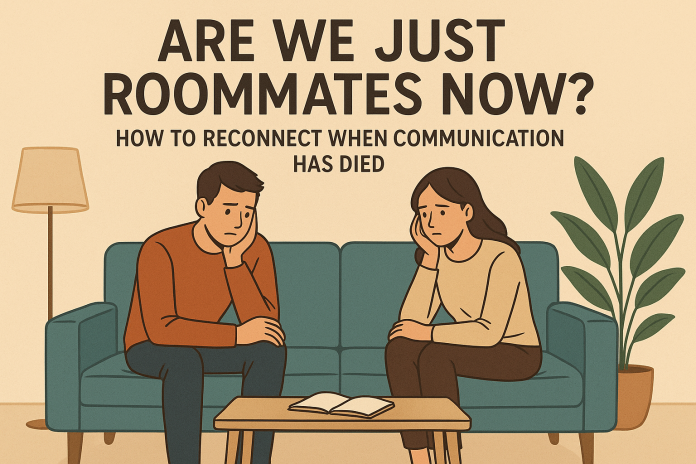Do you ever feel like you’re just coexisting under the same roof with your partner? Like two people living side-by-side, fulfilling chores and responsibilities, but not truly connecting anymore?
You’re not alone.
Many couples fall into this emotionally silent phase—often without realizing it. The spark fades. Conversations become transactional. And before long, you’re wondering if you’re just roommates.
But here’s the good news: communication is a skill, not a mystery. With the right tools and consistent effort, it’s absolutely possible to rebuild emotional closeness and feel truly heard and understood again.
What Is the “Roommate Phase” in a Relationship?
Signs Your Relationship Feels More Like Coexisting Than Loving
The “roommate phase” often starts subtly. Here are some signs:
- Conversations are brief, shallow, or purely logistical.
- There’s little or no physical intimacy.
- You avoid spending one-on-one time together.
- Eye contact, compliments, and affection are rare.
If these feel familiar, your relationship may be in an emotional holding pattern. This isn’t about blame—it’s about recognition.
Why Do Couples Drift Into Silence?
Emotional disconnection doesn’t happen overnight. It builds slowly through:
- Unresolved conflicts or resentment
- Avoidance of uncomfortable conversations
- Stress, parenting, or external pressure
- Lack of intentional time together
Without regular emotional check-ins, partners can start to feel like strangers, even if they still love each other.
Emotional Disconnection: The Silent Relationship Killer
Feeling Unseen or Unheard by Your Partner
One of the deepest human needs is to feel seen and understood. When communication breaks down, that need goes unmet. It can lead to emotional withdrawal, passive aggression, or even depression.
The Psychological Toll of Poor Communication
Research from the American Psychological Association (APA) shows that couples in emotionally disconnected relationships report higher levels of anxiety, lower self-esteem, and increased stress. Over time, emotional neglect can become more damaging than arguments or infidelity.
How to Reconnect When Communication Has Died
The good news? Connection is rebuildable.
Not through vague promises like “we should talk more,” but through specific, therapist-approved techniques that foster safety, openness, and mutual understanding.
Therapist-Recommended Ways to Rebuild Connection
Use Emotional Check-In Rituals (Backed by the Gottman Method)
John and Julie Gottman’s research recommends weekly emotional check-ins. It can be as simple as sitting down every Sunday night and asking:
- “What was the emotional high and low of your week?”
- “Do you feel connected to me? Why or why not?”
These 10-minute conversations are proven to raise relationship satisfaction.
The Power of Reflective Listening and Mirroring
One reason communication dies is because people stop feeling heard. Reflective listening solves this by repeating back what your partner says before responding. For example:
- Partner: “I feel like you don’t care about what I’m going through.”
- You: “So you’re feeling like I’m not really showing support or concern for your stress lately?”
It might feel robotic at first, but it builds trust faster than any advice-giving ever will.
Avoiding the Blame Game With “I” Statements
Replace blame-laden phrases like “You never listen” with “I feel unheard when I talk and don’t get a response.”
Why it works:
- It prevents defensive reactions.
- It takes ownership of your emotions.
- It makes space for dialogue instead of shutdowns.
Conversation Starters That Go Deeper Than “How Was Your Day?”
Break the Surface: Questions That Spark Emotional Intimacy
Go beyond small talk with questions like:
- “What do you miss about us?”
- “Is there anything you wish I understood better about you?”
- “What was your favorite memory of us this year?”
Rebuilding Emotional Safety: Say This, Not That
Say This:
- “I’m curious about how you’re feeling lately.”
- “Can we talk about something that’s been on my mind?”
Avoid Saying:
- “You never open up.”
- “We always have the same problem.”
Language shapes safety. Soft starts invite conversation.
When DIY Isn’t Enough: Getting Help Without Shame
When to Consider Couples Counseling or Coaching
If you’ve tried tools and still feel stuck, therapy can help. It doesn’t mean you’re failing—it means you’re invested in growth. Especially when communication patterns are deeply entrenched, a neutral third party can make a huge difference.
Finding a Relationship Coach or Licensed Therapist You Can Trust
Look for:
- Credentials (LMFT, LCSW, etc.)
- Specialization in couples therapy
- Approaches like EFT or Gottman Method
Use platforms like Psychology Today, BetterHelp, or your local health network to search by issue.
Small Habits That Bring Back Big Connection
Micro-Affection, Shared Rituals, and Intentional Touch
Rebuilding connection isn’t all about deep talks. Emotional closeness grows from small, everyday gestures:
- A kiss before leaving the house
- A 15-minute evening walk
- Saying “thank you” or “I appreciate you”
Why Reconnecting Doesn’t Happen Overnight (and That’s Okay)
Give yourselves permission to be imperfect. This process is a journey, not a switch. Celebrate each honest conversation, no matter how small.
Every time you choose to engage gently rather than shut down, you’re building emotional trust.
Conclusion: From Roommates to Soulmates — One Conversation at a Time
The roommate phase doesn’t have to be the end of your love story.
With intentional effort, emotional safety, and tools that actually work, you can feel close again.
Start small. Start today.
Even one heartfelt question could be the doorway back to connection.


